
Silent Scope is an arcade game created in 1999 by Konami. The game puts the player in the shoes of a sniper during a series of terrorist incidents. It is the first in the Silent Scope series.
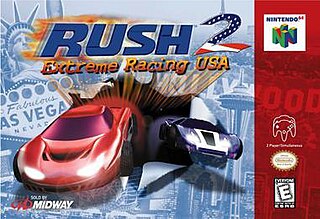
Rush 2: Extreme Racing USA is a racing video game developed by Atari Games and published by Midway Games exclusively for the Nintendo 64 video game console. It was released on November 11, 1998, in North America, and February 4, 1999, in Europe. Rush 2: Extreme Racing USA is a sequel to San Francisco Rush: Extreme Racing, and the second game in the Rush series.

Ridge Racer 64 is a racing video game developed by Nintendo Software Technology for the Nintendo 64 in 2000. It features a total of 20 race tracks, including some drawn from Ridge Racer and Ridge Racer Revolution.

SSX is a snowboarding video game, the first in the SSX series. It was developed by EA Canada and published by Electronic Arts under the EA Sports BIG label for the PlayStation 2 in October 2000. It was the first title released under the EA Sports Big publishing label, which specialized in extreme sports titles with an arcade feel.

Midnight Club: Street Racing is a 2000 racing video game developed by Angel Studios and published by Rockstar Games. The game focuses on competitive street racing and the import scene. The game was released for the PlayStation 2 and Game Boy Advance platforms, the former being a launch title for the platform. It is the first game in Midnight Club franchise, followed by Midnight Club II.
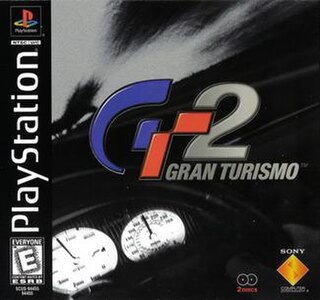
Gran Turismo 2 is a 1999 racing simulation video game developed by Polyphony Digital and published by Sony Computer Entertainment for the PlayStation. It is the sequel to Gran Turismo, the second installment of the Gran Turismo series and the first installment in the series without involvement from Japan Studio. It was a critical and commercial success, shipping 1.73 million units in Asia, 3.96 million in North America, and 3.68 million in Europe for a total of 9.37 million units as of April 30, 2008, and eventually becoming a Sony Greatest Hits game.

Bloody Roar 3 is a 2000 fighting arcade video game developed by Eighting and Hudson Soft. It is the first of the Bloody Roar series to appear on the Sony PlayStation 2.
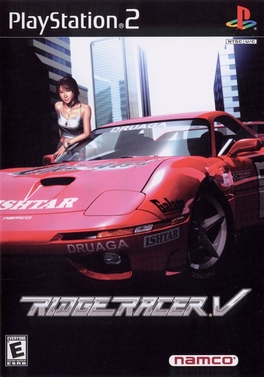
Ridge Racer V is a 2000 racing game developed and published by Namco for the PlayStation 2, as a launch game for that platform. It is the fifth title of the Ridge Racer series succeeding Ridge Racer Type 4 and was followed by Ridge Racer 6 in 2005. The game received a home-to-arcade port named Ridge Racer V: Arcade Battle.

TrickStyle is a futuristic racing video game developed by Criterion Games and published by Acclaim Entertainment for the Dreamcast and Microsoft Windows. Set in the future, the player takes part in stunt-filled hoverboard races through London, Tokyo, and Manhattan, or inside a massive arena called the Velodrome. AirBlade by Criterion and Namco is a spiritual successor. The game received mixed reviews from critics, who praised its graphics and physics, but criticized its gameplay, animations and sound.

California Speed is a racing video game developed and published by Atari Games and Midway Home Entertainment. The game was first released in arcades for Atari/Midway Seattle Arcade System hardware in 1998 and was ported to the Nintendo 64 in 1999 by Midway Games. The Nintendo 64 version of the game contains support for the Controller Pak and the Rumble Pak also the full support for multiplayer mode.
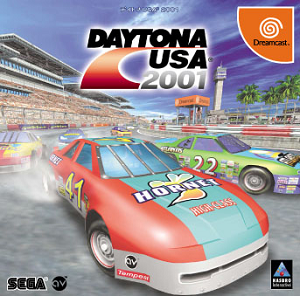
Daytona USA 2001, known in North America as Daytona USA, is a racing arcade game developed by Sega and Genki which is a complete revamp of Daytona USA for release on the Dreamcast platform. This version features every single course from the original Daytona USA game and the Championship Circuit Edition. Three new tracks were specially designed for Daytona USA 2001, and all of the tracks are playable normally, in reverse, mirrored, or in reverse-mirrored mode.

WWF Royal Rumble is a professional wrestling video game released in 2000 for arcades and the Dreamcast. THQ published the title for the Dreamcast while Sega released it for arcades. It is based on the World Wrestling Federation (WWF) professional wrestling promotion and its yearly Royal Rumble event. This game took its influence from the event's 2000 edition. Yuke's, creators of the WWF SmackDown! series, developed Royal Rumble, which had several unique features including support for up to nine wrestlers on the screen simultaneously.
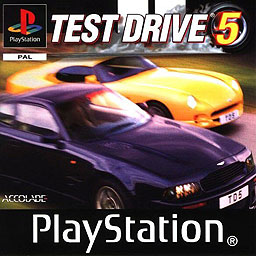
Test Drive 5 is a racing game developed by Pitbull Syndicate and published by Accolade for PlayStation and Microsoft Windows in 1998.

NBA Hoopz is a 2001 basketball video game published by Midway Home Entertainment. It is the sequel to NBA Hangtime and NBA Showtime: NBA on NBC. Hoopz was the only 3-on-3, arcade-style basketball video game available during the 2000–01 NBA season. Shaquille O'Neal is featured on the game cover.
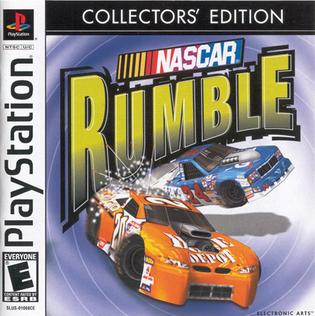
NASCAR Rumble is a racing video game created by Electronic Arts for the PlayStation. Players race through 18 different courses set in six different areas collecting powerups to aid them. The game is a departure from many NASCAR games, as it is an arcade racer featuring various tracks and Mario Kart-esque powerups. A non-NASCAR licensed sequel was made for the PlayStation 2, called Rumble Racing. There are drivers from the then Winston Cup Series and Craftsman Truck Series, as well as legend racers and fictional trucks.
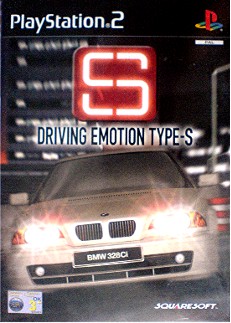
Driving Emotion Type-S is a racing game developed by Escape, a subsidiary of Square. It was published in Japan on March 30, 2000 and was Square's first release for the PlayStation 2 console. After criticisms of the game's handling, the international versions feature revised controls and additional contents, and were released in January 2001.

TD Overdrive: The Brotherhood of Speed is a racing video game developed by Pitbull Syndicate and published by Infogrames for PlayStation 2, Xbox and Microsoft Windows.

Redline Racer is a racing game that was developed by Criterion Games and published by Ubi Soft.

RC Revenge is a racing video game released for the PlayStation in 2000, developed by Acclaim Studios Cheltenham. It is set in 5 different movie worlds in which the player races remote controlled cars across many varied tracks.

Moto Racer World Tour is an arcade style motorcycle racing game developed by Delphine Software International and published by SCEE in Europe and Infogrames in North America for the PlayStation.


















